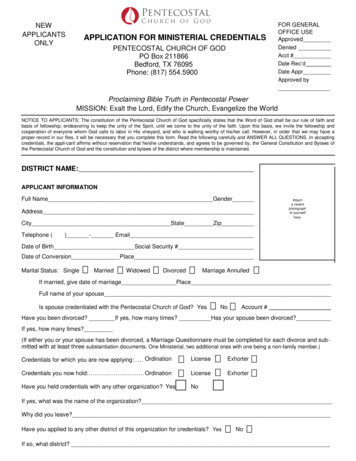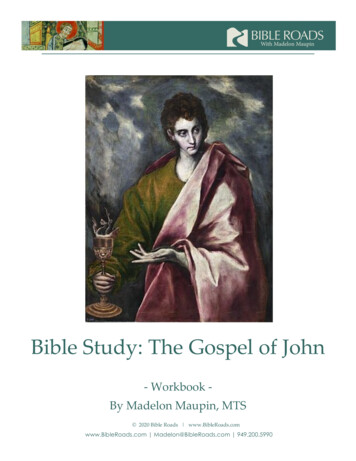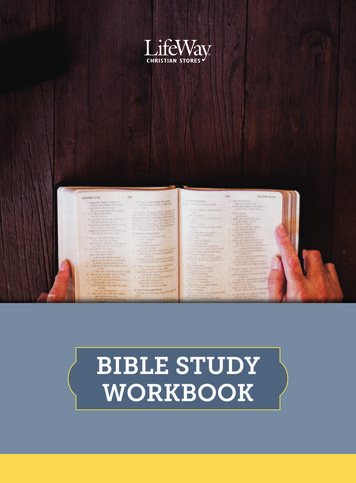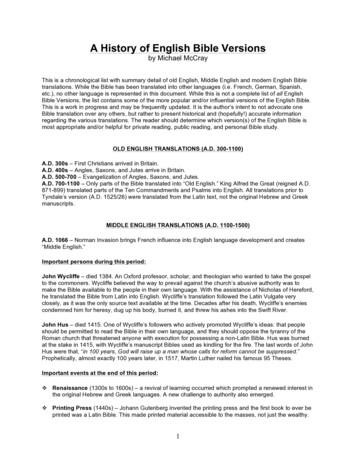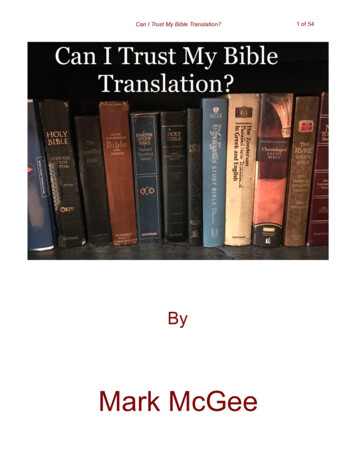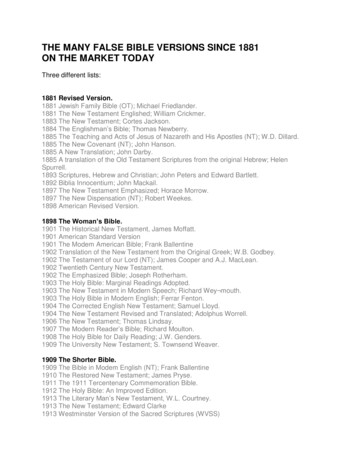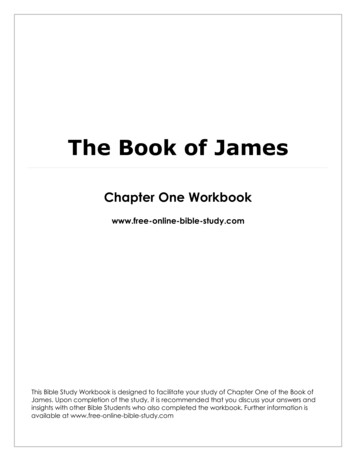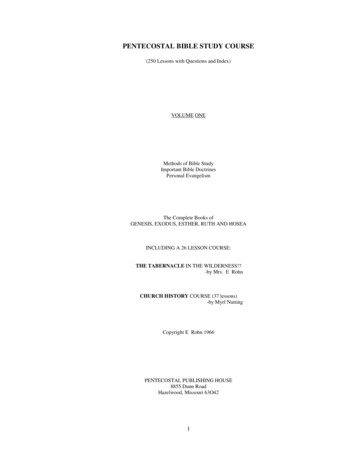
Transcription
PENTECOSTAL BIBLE STUDY COURSE(250 Lessons with Questions and Index)VOLUME ONEMethods of Bible StudyImportant Bible DoctrinesPersonal EvangelismThe Complete Books ofGENESIS, EXODUS, ESTHER, RUTH AND HOSEAINCLUDING A 26 LESSON COURSE:THE TABERNACLE IN THE WILDERNESS!?-by Mrs. E RohnCHURCH HISTORY COURSE (37 lessons)-by Myrl NuttingCopyright E Rohn 1966PENTECOSTAL PUBLISHING HOUSE8855 Dunn RoadHazelwood, Missouri 63O421
2
Lesson No 1INTRODUCTION: THE WORD OF GODC.R.I. Purpose of the Word of God.1 To show the way of life "These things have I written unto you that ye may know that ye have eternal life." I John5:13. The scriptures furnish the only source of such knowledge!2 To show Christ's divinity. John 20:31: "But these are written that ye might believe that Jesus is the Christ, the Son ofGod; and that believing ye might have life through his name."3 As an example(l) of good to follow, and (2) of evil to shun Christ is the perfect example I Pet 2:21 John 13:15 Paultells us we can profit by the warnings of the Word. I Cor. 10:5-11.4 As daily food for the soul. Isa. 55:10-11. As the body lives by natural food, so soul thrives on the Word of God.Deut. 8:3, Job 23:12; Jer. 15:16; I Pet. 2:2.Note: Our chief objective in Bible study is not merely to learn a lot of things about Christ, but to become acquainted withChrist Himself. In John l:14 we see that "the word was made flesh and dwelt among us." In other words, Christ is the livingWord. No one can truly say that he knows the Word, without being acquainted with the Christ who inspired its writings.Knowing Christ makes the Bible a new book to its readers. A story is told of a woman who was given a copy of a certainbook, but finding the book very uninteresting took it to the attic where it was left for a number of months. One day she wasintroduced to a well-known author, and became quite well acquainted. Later on this man inquired as to whether she had reada certain book he had written. Recognizing the name of the book as the one she had carried to the attic, she went home, tookthe book from its hiding place, and this time she found the book to be one of the most fascinating she had ever read. Whatmade the difference? She had become acquainted with the author!II. Methods of Bible Study.1. As an inspiration for worship. As we read the songs of praise and the prayers of those whose hearts reached out after God,we are inspired to worship, and to seek God for the blessings they enjoyed.2. The biography method. The study of the lives of great Bible character will-prove interesting to any who choose thismethod. Notice what preparation they made for the service they rendered., how they over-came the handicaps in their way,and also the mistakes which we can avoid.3. By chapters or books. In studying a book, it is necessary to note (1) its author, (2) to conditions which made the writingof the book necessary, (3) to whom it is written, and (4) the chief subjects covered, "In studying some books it is well to giveeach chapter names, suggestive of the contents. Practice thinking through an entire book consecutively by chapter names."Saxe.4. The subject method, such as is found in Volume two in this course.III. Importance of Memory Work.1. When studying by chapters, memorize the outstanding verse.2. When studying subjects, it is best to memorize several scriptures which link together in a comprehensive manner. Also theHoly Spirit is invaluable in "bringing all things to our remembrance."3
Lesson 2IRULES FOR STUDYC.R.When studying by books1First note the purpose and the general divisions of the book before attempting to take up the details. Someone hassaid it is well to use the telescope first, and the microscope afterwards. The details will have more meaning as they arerelated to the whole.2. Read the book carefully before considering comments on the same. A matter of first importance in studying thescripture is to become familiar with the material. It will not be so difficult to find what the Bible means if you are firstcareful to note exactly what it says.3. Maps will prove to be of benefit. Locate the main events studied, geographically on the map.II. Remember that the Word is divinely inspired. II Pet. 1:21.1. The Spirit and the Word agree, for the Word is a product of the Spirit of God. Ezek 1:3: "The word of the Lordcame to Ezekiel, and the hand of the Lord was there upon him." See also II Tim. 3:16 and Acts 1:16. In Rev. 14:13,John "heard a voice from heaven, saying unto him, Write "2. Since God 1s Word is inspired, yes, is the very Spirit of God talking to our hearts, another important rule is: Acceptno so-called "revelation" which is out of harmony with the Word of God.3Since God's Word is inspired, it does not need to be "defended This principle will help workers to give out theWord, but not to merely argue the Word You do not need to defend the Word any more than you would have to defenda lion-just turn it loose and it will defend itself!4. We cannot say that the words written in italics are inspired, for they did not appear in the original manuscript.These words are put in a different kind of print from the main context, to show that they were added by the translatorsto make the meaning more clear. A good rule to follow concerning words in italics is: If the added word does notchange the meaning of the verse, accept it, but if the word or words added change the meaning, leave them out. Inother words, any verse should mean the same, with or without the words in italics.III. Figurative languageNever take a scripture to be figurative language unless the Bible furnishes you with the key to the figure.For instance, in I Pet. 3:20-21, Peter is talking about the Ark whereby eight souls were saved by water. Then in thenext verse we are given the key to a spiritual application, when he says, "The like figure whereunto even baptism dothalso now save us."Another clear example is found in Gal. 4:23-24. Here Paul is writing concerning the bond woman and the free woman.He plainly says: "Which things are an a11egory, for these are the two covenants."Many have found some things which illustrate a spiritual truth, and because they did not observe this rule of Biblestudy, they went to the extreme and began to spiritualize every Bible truth, drop-ping even the literal significance.Through this error some have done away with the Lord's supper, with water baptism, and have ceased to believe thatJesus is literally coming in the clouds of glory!4
IV. Our attitude toward new truth.1. No matter how much we may have 1earned of the Word of God, we should maintain a teachable spirit. To setone's mind against every-thing that is new is to miss many things that would have blessed the people to whom youminister. The more one studies the Word of God, the more he sees there is to learn!2. On the other hand, we are given the warning by Paul in Heb. 13:9 "not to be carried about with divers and strangedoctrines." Additional truth will never nullify truths already revealed. A genuine love for the truth is the greateststabilizing force in the wor1d. If a man loves anything more than the truth (his own way, great personalities,manifestations or miracles) he may receive a strong delusion, and be lost in the end.V. Ways of testing the truth.1. Does it glorify Christ? You will find the more truth you gain, the bigger Jesus you will have on your hands2. Does it make us more like the pattern of the early Church as written in the Acts of the Apostles? Paul warns inGal. 1:8, and 10-11 that though he or an angel from heaven preach any other gospel than that of the Apostles, "lethim be accursed." In Heb. 8:5 the church is exhorted as was Moses: "See, saith he that thou maketh all thingsaccording to the pattern." And in Jude 3, we are told to earnestly contend for the faith that was once delivered untothe saints."3. Do all scriptures harmonize on the subject? R.Bullock.In I Thess. 5:21 we are told to "Prove all things and hold fast that which is good. I? We cannot say that we havethoroughly proven any subject, or are grounded on the truth, until we can harmonize all the scriptures. For instance,one could not say that he had the truth on baptism in the name of Jesus, who would purposely dodge Matt. 28:19. Tothose who have the truth on this subject, Matt. 28:19 is one of the strongest scriptures that can be used to teach waterbaptism in the name of Jesus.4. Does it tend to make us live more holy lives?The real truth of God will tend to promote holiness in the lives of those who will take heed thereto. Forinstance, the truth of the second coming of Christ promotes holiness, for it is a "purifying hope." I John 3:2-3.As a contrast to this, some teachings tend to cause those who have accepted them to become lukewarm. Falsedoctrine is a great weapon in the hands of Satan in making foolish virgins. As one ex-ample, if we believe thatbeing once saved, we shall always be saved, and that it is impossible to fall from grace, the enemy of our souls hasan added weapon to use against us in trying to make our lives careless and unfruitful.5
C.R.Lesson 3GROUPING THE BOOKSI. IS OUR BIBLE COMPLETE?There are 66 books in our Bible. Some people claim that there are 12 books which belong in the scriptures that are notincluded in our Bible. These 12 books are called the Apocrypha. The Candlestick in the Tabernacle was composed of 66parts, the holy oil running through-out. This is a good picture of the Word of God inspired throughout by the Holy Spirit. Itis also significant that at no time did Jesus quote from any of these 12 extra books.II. The Old Testament is composed of 39 books:1. Genesis4. Numbers(1) Law2. Exodus5. Deuteronomy3. Leviticus(2) History(3) Poetry(4) MajorProphets(5) MinorProphets1.2.3.4.5.6.JoshuaJudgesRuthI SamuelII SamuelI Kings1. Job2. Psalms3. Proverbs1. Isaiah2. Jeremiah3. Lamentations1.Hosea2.Joel3.Amos4.Obadish5.Jonah6. Micah7. II Kings8. I Chronicles9. II Chronicles10. Ezra11. Neahmiah12. Esther4. Ecclesiastes5. Songs of Solomon4. Ezekiel5. Daniel7. Nehum8. Habakkuk9. Zephaniah10.Haggai11. Zecharish12.MalachiIII. The New Testament is composed of 27 books:(1) Biography: 1. Matthew, 2. Mark, 3. Luke,4. John(2) History: The Book of Acts(3) Epistles:1. Romans, 2. I Cor., 3. II Cor., 4. Galatians5. Ephesians, 6. Philippians, 7. Colossians8. I Thess., 9. II Thess., 10. I Timothy11. II Timothy, 12. Titus, 13. Philemon14. Hebrews, 15. James, 16. I Peter, 17. II Peter18. I John, 19. II John, 20. III John, 21. Jude(4) Prophecy: Revelation.Note: There is a teaching that the Old Testament is not for us today. However, the Old T. was all the early Church had for aBible! Much of the Epistles are sermons from Old Testament texts. See I Cor. 10:1-11.6
C.R.Lesson 4THE SEVEN DISPENSATIONSI. MAN'S INNOCENCE.1. This dispensation began at the creation of man and extended until the time that Adam and Eve yielded to the voice ofthe tempter and fell into sin. See Gen. 3:6. During this time man was free from sin, having not even the knowledgeof evil.2. This dispensation, (as is true with each of the seven) ended in judgment. In this case it consisted of Adam and Eve'sbeing driven from the Garden of Eden. This judgment included the curse upon the ground of thorns and thistles, andthe earning of bread by the sweat of the brow. Gen. 3:17-24. Deaths, heretofore unheard of, were passed upon allmen.II. CONSCIENCE.1. This dispensation extended from the fall of man until the flood. Man now was possessed with a "conscience," aninstinctive knowledge of good and evil.2. During this period the wickedness of man so increased upon the earth that God "repented that He made man," andended this period of time with the judgment of the great flood.III. HUMAN GOVERNMENT.1. This dispensation covers the period of time between the flood and the building of the tower of Babel. Since thegovernment was not directly controlled through any prophet, this period is called that of Human Government.2. The judgment which fell in this case was the confusion of tongues, during the building of the tower which caused thepeople to be scattered abroad upon the face of the earth. Gen. 11:7-8.IV. PROMISE.1. During this period we read of God's promises, through which the people were led. Note especially God's promise toAbraham, Isaac, and Jacob. Gal. 3:16.2. The close of this dispensation finds the children of Israel in bondage in Egypt. Canaan was the land of "promise."Trouble was bound to come when they left the land God had given them for their dwelling place. Those who arefilled with the Spirit are in the "land of promise." To turn aside from a Spirit-led life is to become enslaved under thebondage of Satan.V. LAW.1. This dispensation covers the period of time from the giving of the Law by the hand of Moses, until Christ comes onthe scene. During this time Israel was governed by the Old Covenant.7
2. At the end of this period the judgment fell upon Christ, ending the dispensation of Law with the Crucifixion.Christ, who knew no sin, became sin for us, taking upon Himself the penalty which belonged to them who hadtransgressed the Law. Isa. 53:6:"All we like sheep have gone astray; we have turned every one to his own way;and the Lord hath laid on him the iniquity of us all." See also Rom. 5:6, Heb. 9:28, I Peter 2:24.VI. GRACE.1. The dispensation of Grace is the one in which we are now living. It extends from the day of Pentecost, whenthis "grace" message was first preached, until the Second Coming of our Lord. We are saved by grace and notby works. Rom. 11:6. "For by grace are ye saved through faith; and that not of yourselves, it is the gift of God,not of works, lest any man should boast." See Eph. 2:8-9.2. Judgment will fall in the earth at the close of this Church Age, or Age of Grace, in the form of the GreatTribulation. "For then shall be great tribulation, such as was not since the beginning of the world to this time,no, nor ever shall be." Matt. 24:21. See also Luke 21:25-28.VII.THE KINGDOM.1. This is the period of a thousand years following the coming of the Lord in the clouds. II Peter 3:8-12. Duringthis time Jesus will take over the reins of the government as King of Kings and Lord of Lords."Thegovernment will be upon his shoulder," (Isa. 9:6), and righteousness shall cover the earth as waters cover thesea. Zech. 14:9: "And the Lord shall be King over all the earth: in that day (the thousand year day) shall therebe one Lord and his name one." See Rev. 20:5, II Tim. 2:12, Isa. 65:18-25, Jer. 31:34.2. This dispensation shall end with the Great White Throne Judgment. "Because he hath appointed a day, in thewhich he will judge the world in righteousness by that man whom he hath ordained." Acts 17:31. ".It isappointed unto men once to die, but after this the judgment." Heb. 9:27. Also Rev. 20:12.Note: The importance of understanding dispensational truth cannot be stressed too firmly. Taking a scripture whichbelongs to one dispensation, and applying it to another, will lead into many false teachings. For instance, the literalkeeping of the Sabbath, and abstaining from certain meats were given to Israel in the dispensation of the Law. Theywere never carried over into the dispensation of Grace.8
C.R.Lesson 5THE PAHALLEL BETWEENISRAEL AND THE CHURCHWhen we find that the scriptures show a clear parallel between Israel and the Church, and what right we have to call theChurch "Spiritual Israel," we have in our possession one of the most valuable principles of understanding the Word of God.Since about two thirds of the Bible is given in a literal sense to natural Israel, the Church would have very little of the Bibleleft to claim as its own, unless the same promises given to Israel literally, were for the Church in a spiritual sense. Allthrough our lesson we will find the Church coming in ahead of Israel, and enjoying the promises made to God's chosen race,before they are ever fulfilled in natural Israel.The first question to settle is, "What people belong to Israel, and what people belong to the Church?" We find that Israelis made up of the descendants of Abraham through Isaac and Jacob, while the Church is made up of the spiritual seed ofAbraham, through Christ.Let us turn to the 9th chapter of Romans and begin reading at the fourth verse. We find that Paul's kinsmen according tothe flesh were "lsraelites; to whom pertaineth the adoption (recognition as God's sons-Wey.) and the glory and the covenants,and the giving of the law, and the service of God, and the promises." The question is, if these things belonged to naturalIsrael, where does the Church come in? If the glory belongs to Israel, if they are the ones who were to perform the service ofGod, and they are the ones to whom the promises are given, where does the Church get in on the glory, how is it that theChurch is performing the service of God, and what part of the promises have the Church a right to claim? Speaking of thesepromises, Paul goes on in the 5th verse to tell us: "Whose are the fathers (in other words the promises were given toAbraham, Isaac, and Jacob), and of whom Christ came."We find the answer to these questions in the fact that Abraham had both natural and spiritual seed. In Gen 22:l7 we readin God's promise to Abraham, "That in blessing I will bless thee, and in multiplying I will multiply thy seed as the stars of theheaven, and as the sand which is upon the sea shore." God pictured the seed of Abraham both as the SANDS of the sea, andas the STARS of heaven, showing that his seed would be a heavenly people as well as an earthly people.For Paul to say that the glory and the promises were given to Israel, and yet to make the statement that Israel had rejectedthe Christ, sounded as though the plan of God had failed! But Paul is careful to explain in the 6th verse of Rom. 9, "Not asthough the word had taken none effect, for they are not all Israel, which are of Israel", or in other words, all who have sprungfrom Israel do not count as the true seed No, God's Word did not fail, even though Jesus "came to his own and his ownreceived him not." The Lord was yet to find a seed that would serve him. Ps. 22:3O: "A seed shall serve him. it shall be accounted to the Lord for a generation."In Romans 9:7 we see in a figure how that those who receive the promise are counted as the seed, the spiritual seed ofAbraham, and therefore the true children of God. "Neither because they are the seed of Abraham are they all children, but inIsaac shall thy seed be called." Not all the descendants of Abraham were counted as natural Israel, but only those who camethrough Isaac, for Isaac was a child of promise. In the next verse we find Paul giving us the parallel of Israel to the Church:"That is, they which are the children of the flesh, these are not the children of God, but the children of the promise arecounted for the seed." Neither are all the descendants of Isaac termed as natural Israel, but only those who came from his oneson, Jacob. In this instance the Lord changed the order of things before the children were born, saying, "The elder shall servethe younger." (12th vs.) The Lord was showing here how He magnified the second birth over the first birth. The natural seed9
had to come through him of the second birth to make the type clear, that only those who have been born again, can be thespiritual seed, or the Church.In Rom. 4:11-13 we find how the Gentiles through faith could be counted as the spiritual seed of Abraham: "And he(Abraham) received the sign of circumcision, a seal of the righteousness of the faith which he had, yet being uncircumcised,that he might be the father of all them that believe, though they be not circumcised (or, though they be Gen-tiles)". Abrahamdid not receive circumcision until he was 99 years old, and at that time it was a seal of the faith he already had manifestedbefore he was circumcised. This was for the purpose that he might be counted as the father of all believers, even of thosewho had never been circumcised.The spiritual Jew is described in Ron. 2:28-29: "For he is not a Jew which is one outwardly; neither is that circumcision,which is out-ward in the flesh, but he is a Jew which is one inwardly, and circumcision is that of the heart, in the spirit andnot in the letter." Those who have cut off the works of the flesh are the spiritual Jews. What a plain statement is made inGal. 3:7, "Know ye therefore that they which are of faith, the same are the children of Abraham." Also in Gal. 3:29 we read,"And if ye be Christ's, then are ye Abraham's seed, and heirs according to the promise." Those who thought they had theadvantage be-cause they were the natural seed of Abraham were rebuked by the Lord in John 8:39: "They answered and saidunto him, Abraham is our father," Jesus saith unto them, "If ye were Abraham's children, ye would do the works ofAbraham."Therefore the Church becomes heir to the promise of Abraham be-cause they are blood relatives of Christ, who was theseed of Abraham. "For he is our peace, who hath made both one, and hath broken down the middle wall of partition betweenus; having abolished in his flesh the enmity, even the law of commandments contained in ordinances; for to make in himselfof twain one new man, so making peace; and that he might reconcile both unto God in one body by the cross, having slain theenmity thereby." Eph. 2:14,15,16. This "new man" that was formed by the death of Christ is the Church, the body of Christ.See Col. 1:18,24. By becoming children of faith, they have a right to the glory, the ser-vice of God and the promises thatwere made to natural Israel.10
C.R.Lesson 6ISRAEL AND THE CHURCH (CONTINUED)or'The Children of PromiseIn Heb. 8:9 we find that even the New Covenant was made to natural Israel: "Behold the days come, saith theLord, when I will make a new covenant with the house of Israel and with the house of Judah: Not according to thecovenant that I made with their fathers in the day when I took them by the hand to lead them out of the land ofEgypt. for this Is the covenant that I will make with the house of Israel after those days, saith the Lord: I will putmy laws into their minds, and write them in their hearts, and I will be to them a God, and they shell be to me apeople."This Covenant will not be fulfilled in natural Israel, however, until the earth is in the condition spoken of inthe verse following (Heb. 8:11): "And they shall not teach every man his neighbor, and every man his brothersaying, Know the Lord, for all shall know me, from the least to the greatest." This describes the condition of theearth during the millennial reign, and shows us that the New Covenant promise given to the house of Israel willnot be carried out for them as a race, until the Kingdom dispensation. Here Paul takes a scripture which wasliterally for Israel, and preaches it to the Church!! So we can see that the Church slips in ahead of natural Israel,and enjoys this New Coven-ant promise now, during the dispensation of Grace. Paul was well aware of the factthat the promise was made to Israel, and yet he also knew that the Church was spiritual Israel, and therefore thepromises given to Israel, were for the Church in a spiritual sense.We are now going to trace the promise given to Abraham down through Isaac, and Jacob, through Christ, andfinally to the Church. The promises were made to Abraham and his seed. The word "seed" here refers to ChristHimself (Gal. 3:16). "Now to Abraham and his seed were the promises made. He saith not, And to seeds, as ofmany (plural) but as of one, And to thy seed, which is Christ."In Gen. 22:18, an angel of heaven repeats the promise given to Abraham: "And in thy seed shall all thenations of the earth be blessed." Christ was to come through Abraham, and through Christ there was a blessingpromised which would bless all nations. Since God's power was shown through Israel, and only to the leaders andprophets in Israel, it must have sounded strange indeed for Gad to promise that someday, through Abraham's seed,there would be a blessing which all nations could enjoy. What could such a promise be?In Gen. 26:1-4, the same promise was handed down, not to all of Abraham's children, but to Isaac: "And I willmake thy seed to multiply as the stars of heaven.and in thy seed shall all the nations of the earth be blessed.In Gen. 28:1-4, the promise was passed on to Jacob. From Jacob the see4 was to come through Judah. Gen.49:10.In Psalms 132:1-11, God promises David that it will be through his seed that He will set upon the throne. "TheLord hath sworn in truth unto David; he will not turn from it; Of the fruit of thy body will I set upon thy throne."Verse 11. Notice in the 4th verse David vows not to give sleep to his eyes until he finds a habitation for themighty God of Jacob." David sees that the service of the Lord is still being performed in a tent-like affair, when11
the people live in beautiful ceiled houses. Therefore, he has a desire to build a house worthy of being the dwellingplace for the glory of God. He vows not to sleep until God shows him what place He would choose for a dwellingplace for the mighty God of Jacob. This sounds at first like a very rash vow for David to make, since God did notallow him to erect the Temple. How-ever, David got to go to sleep all right for he prayed through, and God didshow him where the mighty God of Jacob was really going to dwell! In the 6th verse David says, "Lo, we heard ofit at Ephratah." Ephratah is Bethlehem! So the Lord showed David that the real dwelling place of God was goingto be through the birth of the Savior at Bethlehem. "Bethlehem," means "bread basket," and it was rightly named,for out of Bethlehem came the One who was the Bread of Life.In Micah 5:2, we find the proof that Ephratah is Bethlehem, and we find that out of this place comes the rulerof Israel, the seed of Abraham: "But thou, Bethlehem Ephratah, though thou be little among the thousands ofJudah, yet out of thee shall he come forth unto me that is to be ruler in Israel."In Luke 24:49, Jesus gave instructions to the disciples as to how to receive the blessing of Abraham, which hecalled "the promise of the Father." He said, "And behold I send the promise of my father upon you; but tarry yein the city of Jerusalem, until ye be endued with power from on high." Now if anyone would question ourauthority to identify the "promise of the Father," with the "blessing of Abraham" let us turn to Gal. 3:14, "That theblessing of Abraham might come on the Gentiles through Jesus Christ; that we might receive the promise of theSpirit through faith." Paul sanctions this connection of the scriptures by declaring that the blessing of Abraham isfulfilled in the Church by the promised Holy Spirit.We can now see that those who do not receive the infilling of the Holy Spirit, are missing out on the verything the Lord has planned should bless all nations. Paul emphasizes this fact in Eph. 1:13-14, when he calls theHoly Spirit, the "Holy Spirit of promise," Concerning the Old Testament prophets and patriarchs, Paul says inHeb. 11:39-40, "And all these, having obtained a good report through faith, received not the promise, God havingprovided some better thing for us, that they without us should not be made perfect. Through the promise of theHoly Spirit, we are provided with something better than any of the prophets were privileged to have.The prophet Joel also explained what sort of a blessing was to be given to all nations through Abraham'spromise when he said, "And it shall come to pass afterward that I will pour out my spirit upon all flesh (or allnations). Joel 2:28. Peter was careful to explain on the day of Pentecost that the experience the 120 receivedwhich came with speaking in other tongues, was that outpouring of the Spirit which Joel prophesied God wouldsend upon all flesh. Acts 2:15-18. In Acts 3:25-26, Peter reminds the Jews that they are the children of Abraham,whom God promised, "In thy seed shall all kindred's of the earth be blessed. Unto you first, God, having raisedup his Son Jesus, sent him to bless you." After the resurrection, the only way God sent him was in the power ofthe Holy Ghost!12
C.R.Lesson 7PARALLEL BETWEENISRAEL AND THE CHURCH CONTINUEDI. Israel was "God's elect" according to race-an earthly people, while the Church is "God's elect" according torace-a heavenly people.1. Natural Israel was and is now God's chosen race of people: Isa. 45:4, "For Jacob my servant's sake, andIsrael mine elect, I have even called thee by thy name." Again in Isa. 65:9 we read, "And I will bring fortha seed out of Jacob, and out of Judah an inheritor of my mountains, and mine elect shall inherit it, and myservants shall dwell there." See also Rom. 11:28.2. The Church, or spiritual Israel, is also spoken of as God's elect, God's chosen body of people according tograce. "Even so at this present time also there is a remnant according to the election of grace," Rom. 11:5Here Paul is talking about a remnant of Israel who became converted, and therefore were now in the electbody according to grace I Pet 5:13: "The Church that is at Babylon5 elected together with you, salute you" Luke 18:7, II Pet 1:10.II. Those in Israel come from Isaac, who was of miraculous birth. Those in the Church are also of miraculousbirth in a spiritual sense.1 In Rom. 9:7-9 we find that the seed of Abraham was to come through Isaac, for he was a child of promise,being of a miraculous birth (As Sarah was barren, God had to perform a miracle to give her a son).2 Paul gives us authority to use this as a figure of the miraculous birth of the members of the Church, when hesays in Gal. 4:28, "Now we, brethren, as Isaac was, are the children of promise."III. The purpose for which God chose Israel is similar to the purpose for which He chose the Church.1. The purpose for which God chose Israel was to be a witness to the po
PENTECOSTAL BIBLE STUDY COURSE (250 Lessons with Questions and Index) VOLUME ONE Methods of Bible Study Important Bible Doctrines Personal Evangelism The Complete Books of GENESIS, EXODUS, ESTHER, RUTH AND HOSEA INCLUDING A 26 LESSON COURSE: THE TABERN

